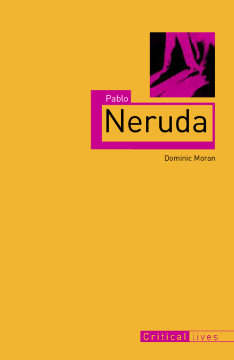
Additional Information
Book Details
Abstract
Pablo Neruda (1904–73) is one of Latin America’s best known poets, adored by readers for the passionate love lyrics written during his early years in his native Chile, and respected by critics for the dark, hypnotic verses he composed during his later, solitary years as a diplomat based in the Far East. As Dominic Moran shows in his concise biography of Neruda, rarely have the life and works of a writer been so intimately and dramatically bound up as they are in Neruda.
In Pablo Neruda, Moran takes a detailed and often critical look at this relationship, focusing as much on what the poetry sometimes strategically hides about Neruda the poet, the lover, and the political proselytizer, as what it reveals. Moran describes a life that was marked by an increasingly militant communism, the seeds of which can be traced to Neruda’s experiences in Spain during the early months of the Spanish Civil War. Throughout the 1950s and 1960s, Neruda became a literary torchbearer for the International Left, and he spent his final years campaigning to bring socialism to his beloved Chile. He lived just long enough to see his hero Salvador Allende unseated by Augusto Pinochet’s bloody coup.
Pablo Neruda paints a fascinating picture of one of the most prodigiously gifted literary figures of the twentieth century. It will appeal to fans of Neruda’s verse who wish to learn more about the life behind it, as well as to readers interested in Latin American literature, politics, and history.
"We’re accustomed to the idea of the great man with the feet of clay, but Chilean poet Pablo Neruda’s were size sixteens. How are we to separate the genius from the jerk? Nothing became his life like the leaving of it, that’s for sure: dying days after Pinochet’s coup, though of natural causes, he won himself a scarcely-warranted martyr’s crown. He really was a piece of work, though, the grovelling servility of his Stalinist loyalty contrasting with the cruel faithlessness he showed the women in his life. Neruda’s was a hit-and-miss muse: some of his writing seemed like so much empty bombast from the start; more caught the mood of the moment but dismally failed the test of time. Yet, as Moran shows in this absorbing study, you might have to take away the dross by the truckload, but what remains is real poetry – among the greatest of our age."--Scotsman
— ScotsmanDominic Moran is a lecturer and tutor in Spanish at Christ Church, Oxford. He has written books and articles on a range of twentieth-century Spanish American writers including Julio Cortázar and Alejo Carpentier. He has also published a critical edition of Neruda’s Twenty Love Poems and A Song of Despair.
